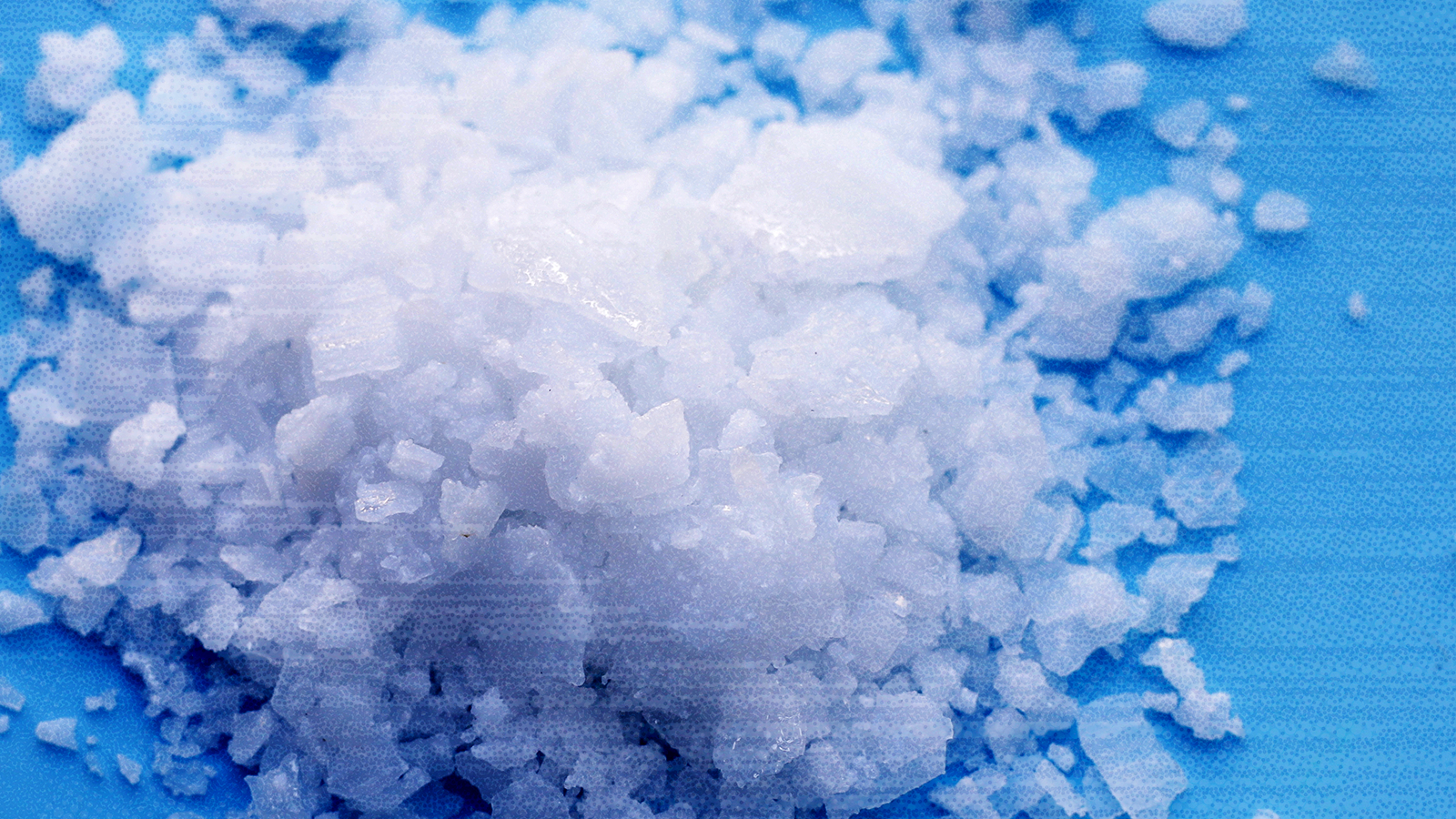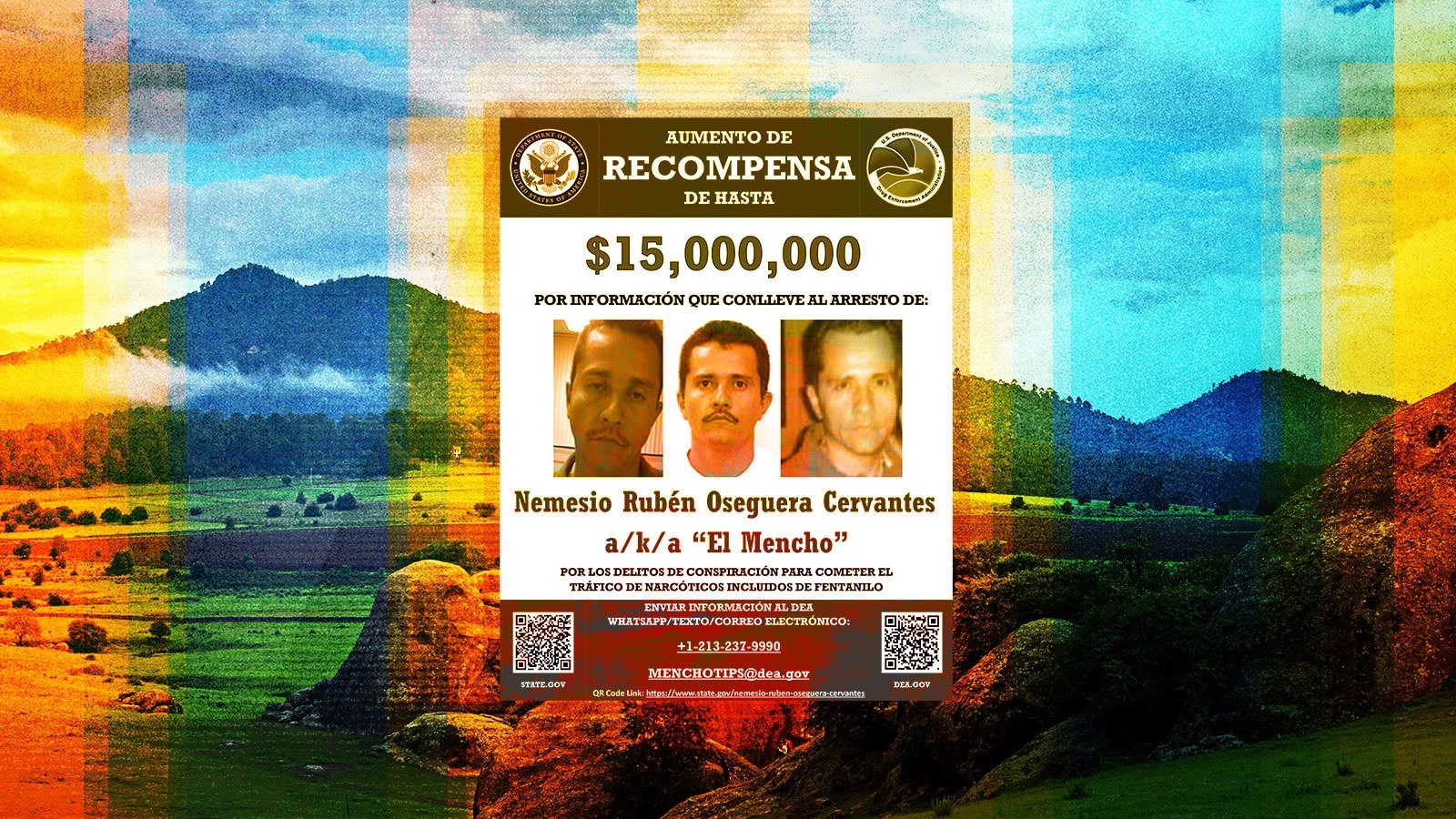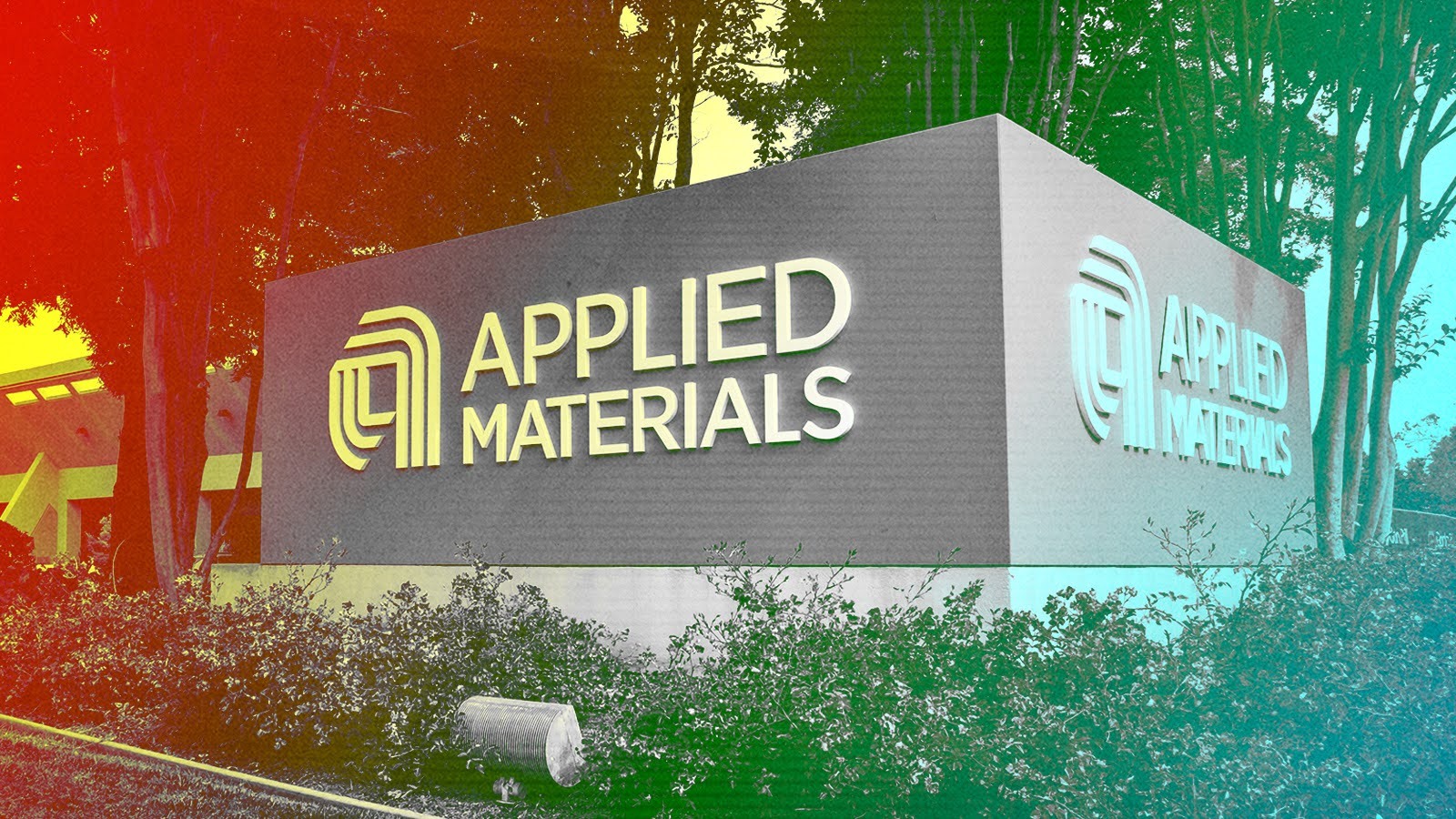When the Department of Homeland Security added caustic soda as a new high priority for forced labor enforcement in August, the industrial chemical joined a list of highly targeted sectors that includes cotton, steel, copper, lithium, tomatoes and polysilicon.
But caustic soda poses a supply-chain challenge for U.S. importers that other Uyghur Forced Labor Prevention Act (UFLPA) priorities don’t: It’s used across a wide range of consumer product categories, then virtually disappears.
Caustic soda, also known as lye, touches everything from smartphone components to fast-fashion dyes, laptop plastics and kitchen cleaners. It etches circuit boards, whitens fabrics and catalyzes plastic production—but it isn’t a component piece.
That creates an entirely different potential risk dynamic for companies navigating UFLPA compliance.
But caustic soda poses a supply-chain challenge for U.S. importers that other Uyghur Forced Labor Prevention Act (UFLPA) priorities don’t: It’s used across a wide range of consumer product categories, then virtually disappears.
Caustic soda, also known as lye, touches everything from smartphone components to fast-fashion dyes, laptop plastics and kitchen cleaners. It etches circuit boards, whitens fabrics and catalyzes plastic production—but it isn’t a component piece.
That creates an entirely different potential risk dynamic for companies navigating UFLPA compliance.
Why It Matters
China dominates global caustic soda production, primarily through Xinjiang Zhongtai Chemical and its parent, Xinjiang Zhongtai (Group). The U.S. added both to the UFLPA Entity List in 2023 over ties to labor transfers, which are a common indicator in China of Uyghur forced labor.- According to DHS’s UFLPA strategy update in August, China’s second-largest producer of caustic soda is Xinjiang Tianye Group, which is owned by the Xinjiang Production and Construction Corps. That’s a government entity that the U.S. sanctioned in 2020, over its role in Uyghur forced labor and other human rights abuses in Xinjiang.
Since its UFLPA designation, Xinjiang Zhongtai has continued exports, often channeling shipments through intermediaries across Vietnam and other manufacturing hubs. Those pathways allow the chemical to seep into U.S. and global supply chains under layers of obscurity, a Kharon investigation found.
The risks fall into two categories:
What CBP said: In response to emailed questions, a Customs and Border Protection spokeswoman declined to comment on the agency’s strategy for caustic soda enforcement or its broader “trade enforcement activities.”
CBP “proactively addresses supply chain risks associated with goods destined for the United States that are made, wholly or in part, with forced labor,” the spokeswoman said.
But listings on an online business-to-business platform suggest that the only branded caustic soda that Fondland markets is Zhongtai’s, often in packaging emblazoned with Zhongtai’s web address.
The risks fall into two categories:
- direct exposure, in which Xinjiang-origin caustic soda itself is sold into the U.S.
- process exposure, in which caustic soda is used during production.
What CBP said: In response to emailed questions, a Customs and Border Protection spokeswoman declined to comment on the agency’s strategy for caustic soda enforcement or its broader “trade enforcement activities.”
CBP “proactively addresses supply chain risks associated with goods destined for the United States that are made, wholly or in part, with forced labor,” the spokeswoman said.
Direct Exposure: Cleaning Products
Trade records show that Everclean Eastern, a New York-based maker of soaps, detergents and industrial-strength cleaners, sourced caustic soda until early 2023 through a prolific Hong Kong-based seller of Xinjiang Zhongtai caustic soda. After Xinjiang Zhongtai’s UFLPA Entity List designation in June of that year, Everclean began sourcing caustic soda from the Chinese supplier Fondland Chemicals—purchases that trade data shows continued at least through April 2025.But listings on an online business-to-business platform suggest that the only branded caustic soda that Fondland markets is Zhongtai’s, often in packaging emblazoned with Zhongtai’s web address.
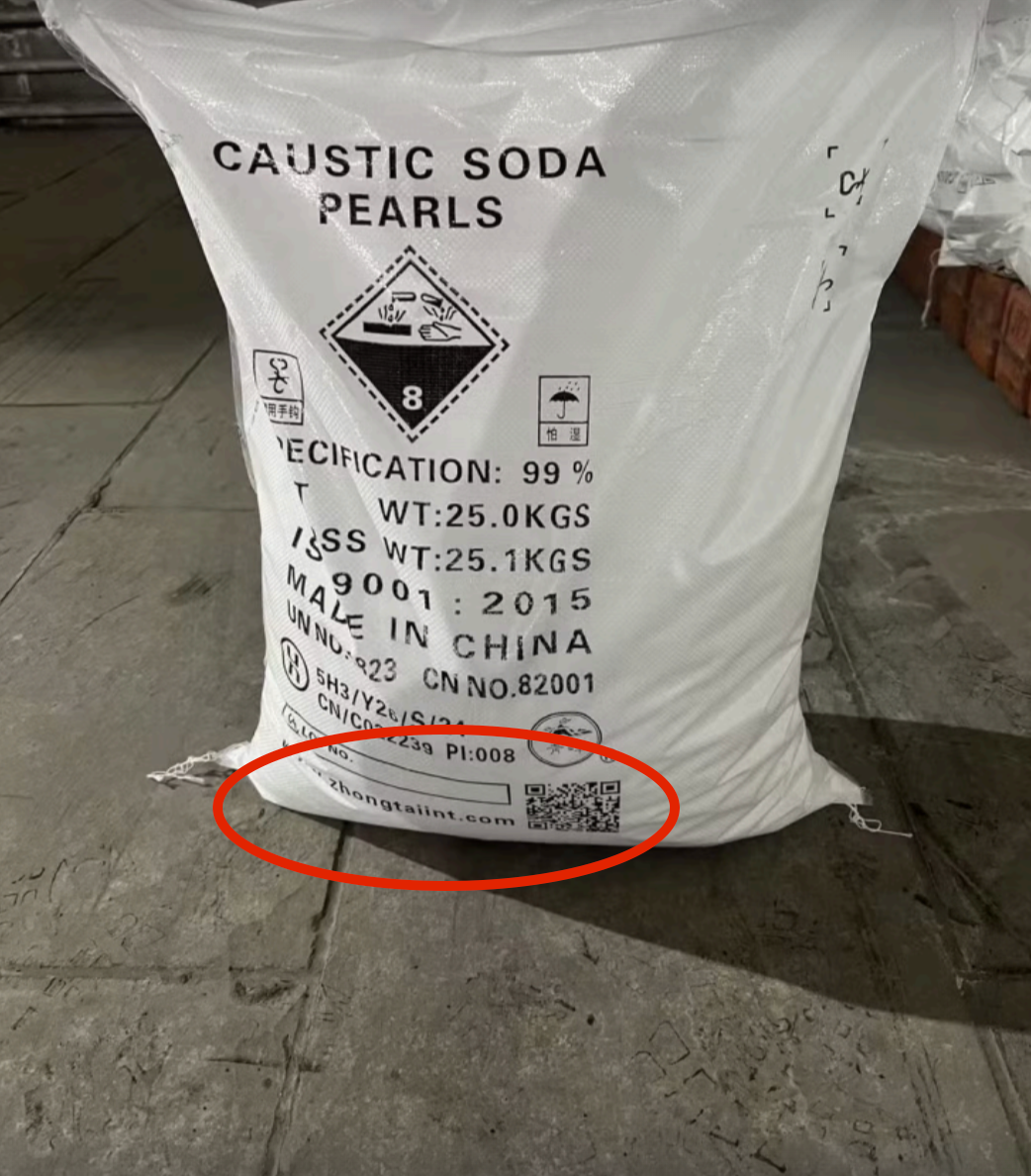
A bag of caustic soda pearls from Fondland Chemicals, as seen on a B2B sales platform, displays Xinjiang Zhongtai’s website on its packaging.
A Kharon review found that Everclean Eastern’s products are available for sale in the U.S. through online Chinese-language retailers, including one product called “Super Lye” drain opener.
Everclean Eastern did not respond to an email seeking comment on its suppliers, compliance procedures or whether its products contain Xinjiang Zhongtai caustic soda.
Caustic soda can be used to produce polycarbonate, the plastic found in hard-shell laptop cases. And trade data shows that Ju Teng Electronic sells U.S.-branded laptop covers and screen frame covers to a subsidiary of Taiwan’s Quanta Computer, an original design manufacturer (ODM) for major U.S. brands.
Everclean Eastern did not respond to an email seeking comment on its suppliers, compliance procedures or whether its products contain Xinjiang Zhongtai caustic soda.
Process Exposure: Electronics, Accessories, Textiles
Laptops: Hanoi-based Top Chem Vietnam Company Limited has sold Xinjiang Zhongtai caustic soda for years, trade records show. Among its prominent customers is Ju Teng Electronic Technology Viet Nam, a subsidiary of Ju Teng International Holdings Ltd., which calls itself the “world’s leading notebook casings provider.” The companies provide a gateway for Xinjiang-origin caustic soda to enter global markets.Caustic soda can be used to produce polycarbonate, the plastic found in hard-shell laptop cases. And trade data shows that Ju Teng Electronic sells U.S.-branded laptop covers and screen frame covers to a subsidiary of Taiwan’s Quanta Computer, an original design manufacturer (ODM) for major U.S. brands.
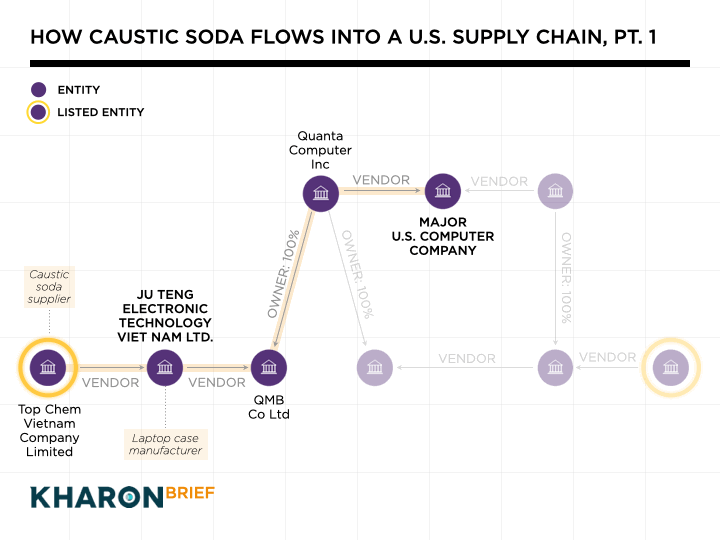
Another Hanoi-based distributor, Inmore Trading, sold Xinjiang Zhongtai-branded caustic soda through at least June to Everwin Precision Vietnam. According to trade data, Everwin Precision as recently as June sold specialized plastic parts for laptops and what it said were aluminum keyboard and laptop covers designed for a second major U.S. brand through another Quanta subsidiary.
- Caustic soda can facilitate aluminum production, too.
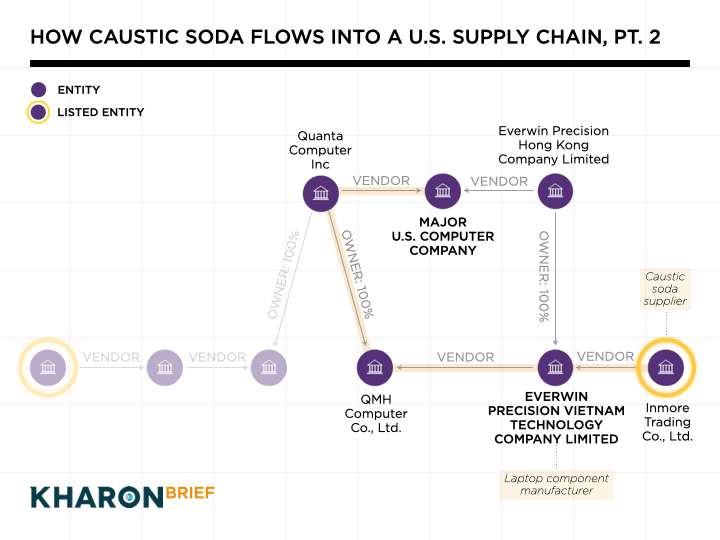
More electronics: Caustic soda is employed in manufacturing a range of other components of U.S.-bound electronics as well. One more company in Vietnam illustrates how:
Vietnam-based Dai Cat Loi has supplied Xinjiang Zhongtai caustic soda to Hong Kong Rise Sun (Vietnam), a textile processor embedded in the supply chains of global fashion brands. Trade data shows that Rise Sun fabric flows to factories in Vietnam and the Philippines that supply major U.S. and European apparel companies.
Read more on forced labor and the UFLPA:
- DBG Technology (Vietnam), a subsidiary of Shenzhen-listed DBG Technology, sourced Xinjiang Zhongtai caustic soda for “machine maintenance” and “wastewater management” as recently as June, trade data shows. DBG Vietnam in turn supplied point-of-sale machines to a New York-based payment-technology company as recently as August. Caustic soda is integral to several stages of manufacturing point-of-sale devices, including their plastics and casings, electronics, circuit boards, and even glass touchscreens.
- The chemical is also used in the production of renewable energy technology, such as microinverters, rapid shutdown devices and power conversion systems. That’s relevant to DBG Vietnam, too: According to trade data, it shipped components to a Texas solar company as recently as August.
Vietnam-based Dai Cat Loi has supplied Xinjiang Zhongtai caustic soda to Hong Kong Rise Sun (Vietnam), a textile processor embedded in the supply chains of global fashion brands. Trade data shows that Rise Sun fabric flows to factories in Vietnam and the Philippines that supply major U.S. and European apparel companies.
In brief
It’s not yet clear how CBP plans to enforce caustic soda imports under the UFLPA, whether from Xinjiang Zhongtai or other high-risk suppliers. But importers of electronics, textiles and other associated goods can assess their exposure by carefully tracing their supply chains, even if they can’t trace the chemical itself.Read more on forced labor and the UFLPA:



